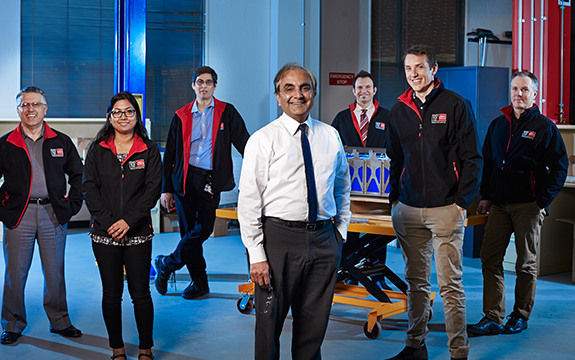Indigenous trade program teaches skills needed to build communities

In Summary
This article originally featured in Swinburne’s Venture magazine
Indigenous trades programs are teaching the skills needed to build communities.
In Australia’s top end, learning a trade can provide Indigenous people with an invaluable opportunity to secure work in their remote communities.
In a partnership between Swinburne University of Technology and Australia’s largest indigenous employer, the Arnhem Land Progress Aboriginal Corporation (ALPA), Yolngu people are being taught the skills needed by labour-hire companies and improving their job prospects.
The team from Swinburne trades is teaching the Certificate III in Remote Area Building Repairs and Maintenance. They have developed two programs, known as Doors 2 Jobs and Cementing the Future, for locals on the remote islands of Milingimbi and Ramingining, 500 kilometres east of Darwin.
In the Doors 2 Jobs course, launched as a pilot program last year, participants are taught how to safely operate hand and power tools, and how to fix doors and windows. In the eight-month-old Cementing the Futures program, students learn how to read building plans, make calculations for aspects of construction and set concrete.
“The idea is to provide these guys and ladies with the skills and the qualifications they need to get jobs in the communities,” says Swinburne Trades teacher Jonathan Wallace. “In these communities there is a lot of work, but people are brought in from Darwin. These guys are living in the communities, but don’t have the skills to get hired.”
With a background in carpentry, Mr Wallace has run another program through Swinburne called Global Tradies since 2012. He has taken construction students to India, Nepal and Cambodia to learn about the challenges faced by developing countries.
“There is a place we go to in India which is making furniture out of cyclone-damaged timber, and they’ve got a huge European market,” he says.
Building on that idea, a team of trade teachers from Swinburne has worked with Northern Territory locals to generate industry on the islands. ALPA recently opened a furniture factory where trainees could build their skills and make saleable products.
“It’s up and running now and they’re building beds and tables and they’re hoping to start using local timbers to make their own complete indigenous line of furniture,” he says. “So we’re giving them skills that allow them to create industry.”
While industry is needed to sustain remote communities, so are the basic skills to fix things.
“One of the things you notice up here is that the local tip is full of stuff that can be repaired. We are trying to give the local people skills to repair those things, rather than dump them,” he says.
“There was a broken bed chucked on the side of the road. We stripped it down and replaced all the broken components and put it back together. The guys used it as a prototype to build more beds.”
The most important thing is to ensure the training is relevant and applicable to the work available.
“The programs are giving them opportunities to take on some of the jobs that they see other people from outside their community doing, and a lot of them have gone to get jobs with local contractors.”
Recently, a group from Cementing the Future landed a job concreting a footpath outside the school in Milingimbi, generating a sense of pride throughout the community.
Team Leader, Trades, Terrence McEvoy says programs would not succeed without support. “Sharon Rice, Head of Department, Trades and Engineering Technology, has provided leadership to the team, enabling us to forge strong relationships with industry partners,” he says.
“And Indigenous Futures Business Co-ordinator Meredith Fraser has been of assistance to our NT students who have low literacy levels and are often known by several names.

